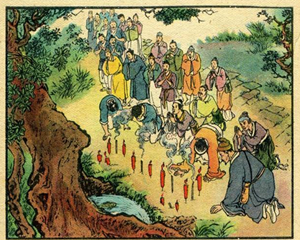古代寓言原是民间口头创作,文学体裁的一种。含有讽喻或明显教训意义的故事。它的结构简短。主人公可以是人,可以是动物,也可以是无生物。多借用比喻手法,使富有教训意义的主题或深刻的道理在简单的故事中体现,而还需要自己去理解,思考,这就是和西方寓言的不同之处。

《古代寓言·神鱼》
会稽石亭埭,有大枫树,其中空朽,每雨水辄满溢。
有估客,载生鳣至此,聊放一头于朽树中,以为狡狯。
村民见之,以鱼鳣非树中之物,咸谓是神。乃依树起屋,宰牲祭祀,未尝虚日,因遂名鳣你庙。人有祈请及秽慢,则祸福立至。
后估客返,见其如此,即取作臛,于是遂绝。
——《异苑》
The Holy Eel
At Stone Pavilion Dam in Kuaji there stands a great maple tree. The trunk has rotted and is hollow; so whenever it rains, a hole in the tree becomes filled with water. A merchant passing here with a load of eels put one eel in the rotten tree for fun.
Since eels do not grow on trees, when the villagers saw it they were sure it must be holy. They built a temple by the tree, slaughtered cattle to sacrifice every day, and called the place The Temple to Father Eel. They believed that those who prayed at the shrine would immediately have good fortune, while those who offended the god would be overtaken by calamity.
When the merchant came back this way and saw what had happened, he took the eel to make eel broth. And so it ceased being holy.
--The Garden of Marvels (YiYuan)
(杨宪益、戴乃迭 译)
更多精品翻译素材,敬请关注可可英语。











